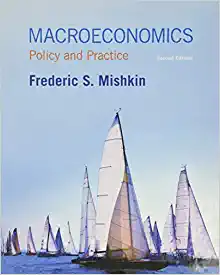Question
1.. When the Central Bank buys a government bond from a commercial bank, (A) reserves in the banking system decline. (B) reserves in the banking
1.. When the Central Bank buys a government bond from a commercial bank, (A) reserves in the banking system decline.
(B) reserves in the banking system increase.
(C) the Central Bank liabilities remain unchanged.
(D) the Central Bank liabilities decline.
2. If the reserve ratio is 25% and the Central Bank increases the quantity of reserves in the banking system by RM120, the money supply increases by (A) RM90.
(B) RM150.
(C) RM160.
(D) RM480.
3. Which of the following actions by the Central Bank would reduce money supply? (A) An open-market purchase of government bonds.
(B) A reduction in banks' reserve requirements.
(C) An increase in the interest rate paid on reserves.
(D) A decrease in the discount rate on Central Bank lending.
4. An institution that accepts deposits for lending purpose is known as (A) a commercial bank.
(B) a central bank.
(C) a government.
(D) an investment bank.
5. Which is the most liquid measure of the money supply? (A) M1
(B) M2
(C) M3
(D) M4
6. The Islamic financial system works on the basis of
(A) sharing return. (B) sharing risk. (C) sharing risk and return. (D) predetermined risk and return.
7.An example of expansionary fiscal policy would be (A) cutting taxes.
(B) cutting production of consumer.
(C) cutting government spending.
(D) cutting prices of consumer goods.
Step by Step Solution
There are 3 Steps involved in it
Step: 1

Get Instant Access to Expert-Tailored Solutions
See step-by-step solutions with expert insights and AI powered tools for academic success
Step: 2

Step: 3

Ace Your Homework with AI
Get the answers you need in no time with our AI-driven, step-by-step assistance
Get Started


